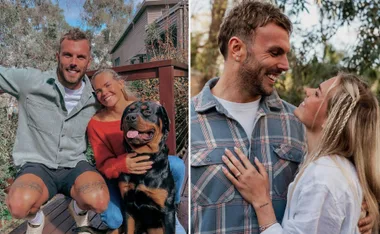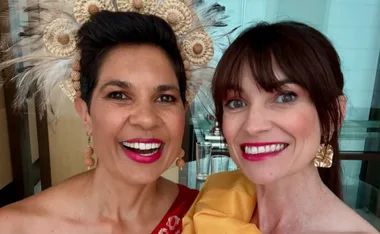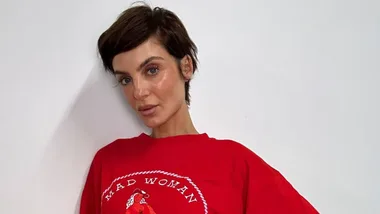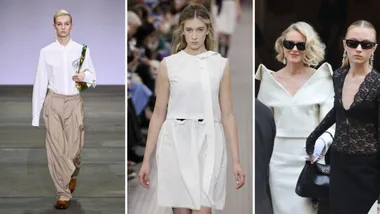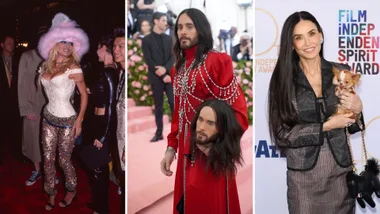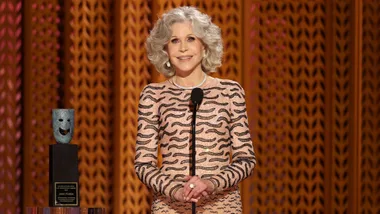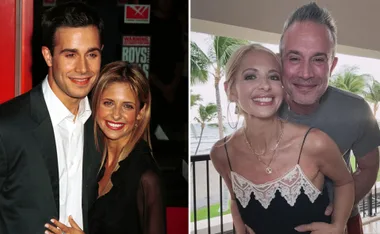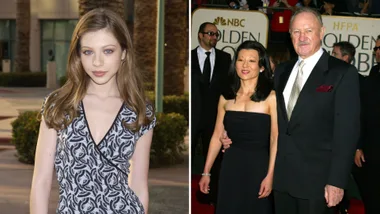Author of the month whose book, The Future Homemakers of America, is featured in The Australian Women’s Weekly, November issue. Here, the acclaimed English writer talks about writing, her book and her extraordinary life-style and a love affair that began with a lonely hearts ad.
Q You live in Venice, of all places?
A Yes, in an apartment on the top floor of a 16th century building. My office is above a busy canal, traffic lights and all. And the terrace where we eat most of our meals looks across the rooftops to the church of Santa Maria Gloriosa dei Frari, a view that has hardly changed in 500 years.
Q How long have you been there and is it wonderful place to live?
A Two years and we love the cit and its way of life. Venice is an old-fashioned city – it has elegance, courtesy, emphasis on family, doing simple things, properly, slowly.
Q Do you feel over-run by tourists at times?
A Tourists are a bit of a minus, but we were tourists ourselves once. The main minus is all the bridges you have to cross in an ordinary day. Su e giu, the Venetians call it (up and down). It’s the kind of tax the city imposes on your knees for the privilege of living here.
Q I imagine freezing winters?
A Yes, but Venice is then at its most lovely.
QAre you there for long and how’s your Italian?
A We’re here long term and yes, I speak Italian.
Q Ever homesick?
A For England, no. For my friends, but they do visit. Ditto family. I miss my own language, but I think exile can be good for a writer. I really LISTEN to English now, when I hear it.
Q You write scripts as well as novels?
A I write radio scripts for the BBC and am currently working on a dramatisation of The Go-Between.
Q Do you travel much?
A Our children live in England and Ireland, my in-laws live in the USA, so a lot f our travel is just keeping up with people. A We aim to explore somewhere different every winter and this year it will be St Petersburg.
Q You studied science at university, which seems strange for a writer?
A It was a mistake, but not a bad one. I’m still interested in the How and Why of things. And I don’t think there’s any such thing as an ideal preparation for becoming a writer.
Q You started out by writing Survival Guides – why?
A The first was a Parent’s Survival Guide. I think I wrote it because al the available guides were so solemn and earnest. By the time I wrote it I had four children, and so I knew the value of a sense of humour and common sense.
Q Did you always dream of becoming a writer?
A I think it was more a case of ‘drift’ than dream. I was nearly 40 before I was published. I never had a plan, but I do believe each of us, if we’re lucky, eventually discover something we can do.
Q Are you a fast writer and how many drafts do you do?
A. Not sure. I write a book a year because I have to – it’s my living. I don’t really do drafts. I correct and correct as I go along. Generally, I write all morning. Sometimes a writer has to get up and walk away from her desk and do some thinking, or ironing, or both.
Q The Future Homemakers is about a bunch of US airmen and their wives living in England, is it based on fact?
A Yes, there were US airmen in the UK and the FHA still does exist. I think it’s unisex these days. The trigger was seeing a photo of American schoolgirls in their early 50s, all bright eyed and optimistic, ready to be good homemakers. I wondered what became of them. Then I made it up.
Q Do you do much research?
A Not much, except for technical detail stuff like how to crash a B-47. I prefer not to hem myself in with too many facts. The flood in the book did happen and yes, there were once plenty of people living in poverty like the character Kath Pharaoh.
Q Who is the first person to read our manuscript?
A My husband, Howard, who is an art historian. Partly because I get no peace until he’s seen it. Mainly because I value his judgement. He never sees it till it’s finished though.
Q I read that you met your husband after answering a lonely hearts ad in London and married three years ago?
A All true.
Q It was a courageous act, what made you answer the ad?
A A moment of madness. Don’t know about courage, but meeting for the first time was nerve-wracking. Howard got dozens of replies, so it wasn’t immediately obvious whether I’d made it onto the shortlist. Or even the long list. However, after our second date he invited me to Paris for the weekend, and we’ve been together ever since. He’s a gem.
Q Your book is set in the 1950’s,how did you replicate it so beautifully?
A The suffocating 50’s? Research, no. Peggy and her friends are my mother’s generation. I saw their lives at first hand.
Q You had your family before you began your career as a writer?
A I had children first because I didn’t have a career or any clear idea how to get one. I hadn’t realised then that I should be a writer. I think I was very lucky. I was able to be at home with my children instead of paying someone else to enjoy them.
Q Did you find it hard being a wife and mother?
A I don’t think I found it so hard. It was very tiring and my (first) marriage ended in divorce, but I never felt seriously stifled. All my life I’ve been able to read and listen to music and draw and write. I don’t think being a woman or a wife or a mother ever stopped me doing anything.
Q How do you see the life of the modern women who combines career with child raising?
A I find their lives completely unenviable. My daughter is juggling a career and motherhood and I don’t see that the satisfaction outweigh the costs. Mainly though, I believe whatever the social climate, some people will find a way through and some people will do nothing and blame their circumstances.
Q Your book is essentially about the friendships between women – do you think women are better at being friends than men?
A Women pay more attention to the things that make a friendship. Listening. Keeping in touch even if there’s nothing much to say. Men prefer to cut to the chase. They’ll call up to arrange a game of tennis, but very rarely just to say, ‘How are you?’
Q Do you have a lot of close friends?
A I refuse to count them. But I love each of them for a different reason. And friendships ebb and flow. Sometimes we’re close. Sometimes we’re not.
Q What about your next book?
A It’s a 70 year saga, beginning in 1912, about the kind of family that nowadays would get labelled ‘dysfunctional.’
The Future Homemakers of America, by Laurie Graham, Fourth Estate, $27.95

